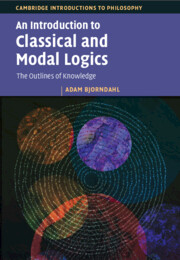Refine search
Actions for selected content:
7 results

An Introduction to Classical and Modal Logics
- The Outlines of Knowledge
-
- Published online:
- 08 February 2025
- Print publication:
- 21 November 2024
-
- Textbook
- Export citation
2 - Classical Predicate Logic
-
- Book:
- An Introduction to Classical and Modal Logics
- Published online:
- 08 February 2025
- Print publication:
- 21 November 2024, pp 43-84
-
- Chapter
- Export citation
THE NONARITHMETICITY OF THE PREDICATE LOGIC OF STRICTLY PRIMITIVE RECURSIVE REALIZABILITY
- Part of
-
- Journal:
- The Review of Symbolic Logic / Volume 15 / Issue 3 / September 2022
- Published online by Cambridge University Press:
- 19 April 2021, pp. 693-721
- Print publication:
- September 2022
-
- Article
- Export citation
ON A QUESTION OF KRAJEWSKI’S
-
- Journal:
- The Journal of Symbolic Logic / Volume 84 / Issue 1 / March 2019
- Published online by Cambridge University Press:
- 14 March 2019, pp. 343-358
- Print publication:
- March 2019
-
- Article
- Export citation
UNIFICATION IN SUPERINTUITIONISTIC PREDICATE LOGICS AND ITS APPLICATIONS
-
- Journal:
- The Review of Symbolic Logic / Volume 12 / Issue 1 / March 2019
- Published online by Cambridge University Press:
- 03 December 2018, pp. 37-61
- Print publication:
- March 2019
-
- Article
- Export citation
GÖDEL’S NOTRE DAME COURSE
-
- Journal:
- Bulletin of Symbolic Logic / Volume 22 / Issue 4 / December 2016
- Published online by Cambridge University Press:
- 30 December 2016, pp. 469-481
- Print publication:
- December 2016
-
- Article
-
- You have access
- Export citation
GENERALITY AND EXISTENCE: QUANTIFICATIONAL LOGIC IN HISTORICAL PERSPECTIVE
-
- Journal:
- Bulletin of Symbolic Logic / Volume 20 / Issue 4 / December 2014
- Published online by Cambridge University Press:
- 30 December 2014, pp. 417-448
- Print publication:
- December 2014
-
- Article
- Export citation



